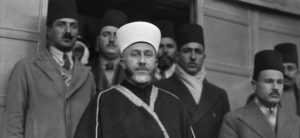 Click here to view the original artice.
Click here to view the original artice.
By DANIEL DE LUCE Associated Press Staff Writer
JERICHO, Palestine, May 2 (AP)-A road of Arab despair winds eastward across the Jordan.
Many refugees passing Jerichoen route to Trans-Jordan, a few miles away, are from Jerusalem and Jaffa. They fear Jewish offensives are crashing through weakened Arab volunteer resistance.
Haifa was described as almost a ghost town with its population dwindling to less than 20,000 from a normal figure at least five times that.
This was the muttered comment of a formerly wealthy merchant from Maillah road in Jerusalem-
“Talk of Arab governments rescuing Palestine sounds like another case of ‘too little and too late.’ If they send all the 30,000 regulars they’re supposed to have promised to send, the Jews have 45,000 trained soldiers here in this country and inexhaustible riches to draw on from overseas.”
MUFTI SCORNED
These Arabs today are quick to attack those they once glorified. They talk slightingly of the exiled Jerusalem Mufti Haj Amin El Husseini.
They say Fawzi Bey Al Kaukji, former chief of the volunteers in Northern Palestine, violated explicit instructions of the Arab League to avoid a pitched battle with Haganah, and instead destroyed the prestige of Arab arms by falling into a Jewish trap at Mishmar Haemek last month.
The once vaunted Arab Liberation Army of Yarmuk is described by the refugees as a hodgepodge collection of adventurers, ne’er-do-wells and soap-box orators who never numbered more than 3000 and who relied on Palestinian Arab villagers for cannon fodder.
The reported agreement by five Arab states to wipe out the Zionist state meets with acid skepticism from the refugees. They claim-
King Abdullah seeks to expand Trans-Jordan to include Southern Palestine, but will not really endanger his Arab Legion in battle because he fears King Ibn Saud may take the opportunity to annex Aqaba and other Southern Trans-Jordan territory to Saudi Arabia.
IRAQ CRISIS
The Iraqi government has failed to solve an economic crisis and is in no position to weaken its army by a Palestine campaign because the Kurds in Northern Iraq, a million strong, are close to another rebellion.
Egypt is more interested in getting the British army to evacuate the Suez Canal zone than in risking armed adventure in Palestine, possibly against a majority opinion of the United Nations.
The army was needed to break a police strike in Cairo and Alexandria last month and may be needed again, for inflation has soured the government servants as well as the working classes against Premier Nokrashy Pasha’s conservative regime.
Egypt’s case against the British army’s canal occupation is built upon the premise Egypt is strong enough to guarantee the canal’s security alone. But if Haganah should upset a token Egyptian army force in Southern Palestine, Egypt would be in a humiliating international spotlight.
TRADITIONAL SUSPICIONS
The Syrian government, which is squabbling with Lebanon over a common monetary system and is traditionally suspicious of Abdullah’s dream of a greater Syria, is wary of large scale involvement in Palestine warfare, because of the ever-present threat of Druse tribal unrest in Southern Syria.
Syrians gambled their reputation on Fawzi Bey’s Yarmuk army, which is mainly Syrian. Its adverse fortunes have sapped Syrian enthusiasm for bigger gambles.
The army in Lebanon, little more than a police force, is not likely to be of military importance against the Jews.
Those are samples of expressions from the refugees, some of them veterans of the Arab rebellion in 1936-39. They think highly of the fighting capability of Haganah.
Haganah includes 23,000 troops who had wartime service in the British army with long training in modern tactics and weapons, they say.
In addition Haganah has one brigade of commandos who were trained by the late British guerrilla expert Order Charles Wingate in 1942 when the British feared Palestine would be overrun by Nazi Field Marshal Rommel.